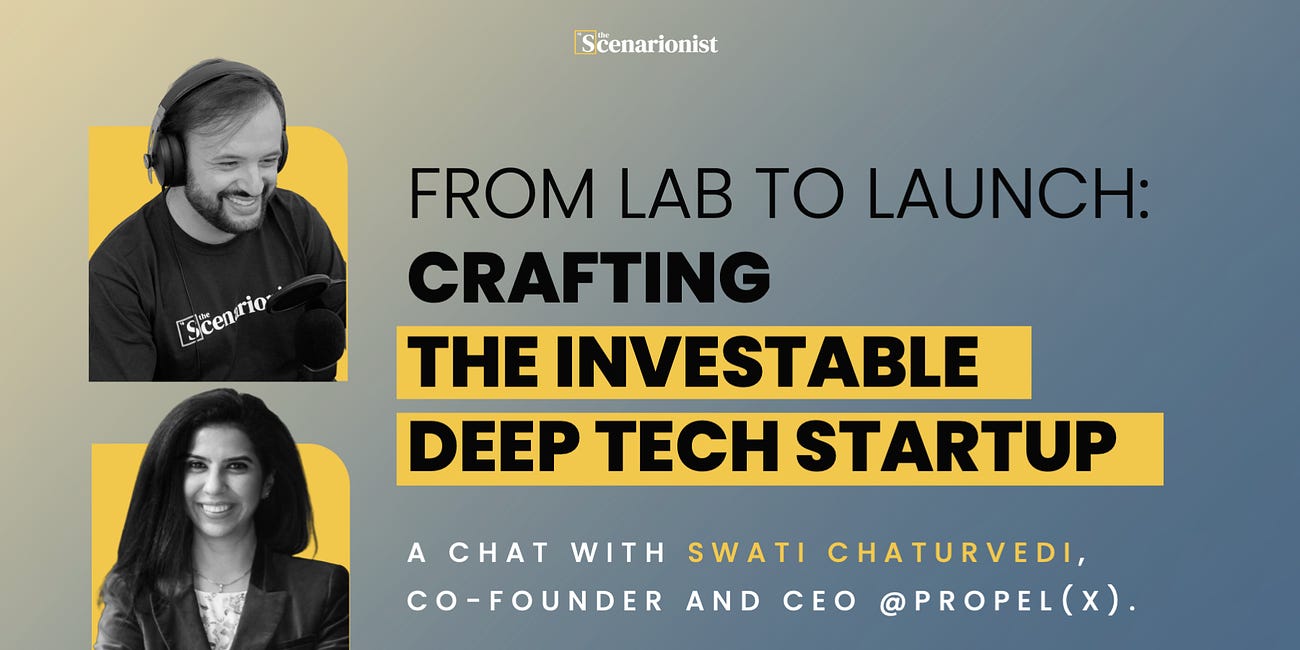Welcome to a new episode of 'Deep Tech Catalyst,' the video podcast that uncovers the secrets of turning cutting-edge scientific discoveries into investable Deep Tech startups.
In this episode, we are thrilled to welcome William Krut, Investment Partner @ Reinforced Ventures, focused on early-stage Deep Tech Startups. We delve deep into the nuances of investor-founder communication, the significance of clear exit strategies, and the importance of understanding how to prove market traction in early-stage Deep Tech, from the investor's perspective.
🎧 Prefer to listen?
🎙 Communication and Pitch Strategies for Deep Tech Founders
In the world of deep tech startups, bridging the gap between groundbreaking scientific innovation and successful market entry is a complex but rewarding journey. This journey is not just about scientific discovery; it's about effectively communicating and translating these discoveries into viable business ventures.
The challenge lies in effectively conveying intricate scientific concepts to investors while showcasing not only the technical brilliance but also the scalability and financial viability of their innovations.
Striking the right balance between in-depth scientific explanations and broad business appeal is key. An efficient approach involves crafting a streamlined pitch deck that focuses on essential elements: business opportunities, technology, market potential, and team capabilities.
Less is often more in this context – a concise presentation complemented by an appendix containing technical details can make a substantial impact. Founders should also emphasize how their technology can be practically applied, illustrating its potential to revolutionize various industries. Here are a couple of tips about it.
It’s Not a Tech, It’s Your (Bold) Vision
Communication can be a significant challenge for founders, as they may struggle to fully convey the vastness of the opportunities they are pursuing. Many founders, often with PhDs or experience in grant applications, are accustomed to setting specific objectives and milestones within defined timeframes, such as six or eighteen months.
While these milestones are valuable, we also seek to understand their overarching vision – what audacious goals do they aspire to achieve in a decade?
Some founders may hesitate to appear overly ambitious, fearing it might deter potential investors. However, a well-structured plan that outlines the path to building a billion-dollar or ten-billion-dollar company over a decade genuinely excites us.
On the other hand, founders sometimes tend to delve excessively into the intricate technical aspects of their innovations. While technical expertise is crucial, maintaining a concise pitch is advisable.
Start with 10 slides (and a rich tech appendix)
A 10-slide pitch deck that conceptually explains how the technology addresses the solution's core is ideal. Additional slides, if needed, can be included in the appendix to provide more detailed technical insights, particularly in fields like biotech or tech-bio, where showcasing specific results or data may be necessary.
Ultimately, we find that a succinct 10-slide pitch outlining the journey to becoming a significant industry player is the most appealing approach for us.
📈 Exit Strategies and Comparable Valuations
For investors, gaining insights into a startup's exit strategy is just as crucial as assessing its innovative potential. Deep tech founders need to go beyond innovation and plan for their technology's future in the market.
Exit Scenarios 101
This entails understanding potential exit scenarios, analyzing similar companies' exit histories, and establishing relationships with industry advisors and potential acquirers. These connections not only provide valuable insights but also showcase a founder's strategic vision and dedication to their venture's growth and eventual successful exit.
In your perspective, is the primary challenge founders face related to a lack of a clear exit strategy or valuation plan? Or are there other critical aspects that often escape their attention when pitching to investors?
The primary challenge doesn't solely revolve around the absence of a well-defined exit strategy or valuation plan, although these are undeniably crucial components. It's more about the comprehensive approach founders adopt for addressing these aspects and how effectively they convey them.
Concerning exit strategy, some founders struggle to articulate potential acquirers or companies with similar business models that might express interest in acquiring them.
We seek a clear understanding of these potential acquirers, including their past exit valuations, if available. Moreover, demonstrating robust relationships with potential acquirers holds significant value.
Having advisors serving on the boards of such companies or securing personal investments from their executives signifies commitment on their part and reduces the risk of abandonment.
When it comes to valuation, proper company structuring to safeguard intellectual property (IP) is essential. Developing a model that allows for the potential spin-off of subsidiaries for specific assets or showcasing the ability to establish a cash-flow-positive business can also provide compelling evidence of valuation potential. The key lies in transparently illustrating how your company can create value, whether through acquisition or alternative avenues
📝 The Value of Letters of Intent (LOIs)
Letters of Intent (LOIs) hold significant potential for Deep Tech startups in their early stages as they can serve as powerful indicators of market traction.
Beyond being mere expressions of interest, impactful LOIs should provide a well-defined roadmap that leads from a Proof of Concept (POC) to a pilot project and eventually to the issuance of purchase orders and the generation of recurring revenue.
The specificity and commitment outlined in these LOIs can substantially bolster the startup's position. Additionally, receiving LOIs from companies spanning multiple industries underscores the technology's broad applicability, highlighting its potential to revolutionize various sectors.
When seeking investment, is it adequate for founders to secure a letter of intent from a prospective partner or customer, or do investors typically require more concrete evidence of interest, such as tangible commercial traction or actual sales?
Establishing commercial traction in the Deep Tech arena can pose challenges. The effectiveness of Letters of Intent (LOIs) can vary depending on their content and specificity, leading to differing investor perspectives. While some investors attach significant importance to LOIs, others may approach them with more skepticism.
A persuasive LOI should transcend a mere expression of interest by delineating specific actions and financial commitments that illustrate a clear path from intent to tangible outcomes.
When LOIs outline key milestones and associated financial commitments, they become more compelling. However, it's crucial to acknowledge that while LOIs can be valuable, certain investors may assign them less weight, placing greater emphasis on demonstrable commercial traction or actual sales.
It's important to recognize that the efficacy of LOIs can also hinge on the industry and the nature of the partnership. Founders should strive to understand their investors' perspectives and preferences concerning the significance of LOIs.
🚩 Key Performance Indicators and Red Flags in Deep Tech Startups
In the initial phases of Deep Tech startups, conventional Key Performance Indicators (KPIs) often prove inadequate in providing a holistic view. Instead, investors place a strong emphasis on the founders' capacity for rapid iteration, goal attainment, and responsiveness to feedback.
This agility and adaptability are pivotal in navigating the unpredictable terrain of Deep Tech. Founders should remain vigilant for warning signs, such as a lack of clarity regarding market opportunities, an excessive focus on technical intricacies at the expense of a robust business strategy, and insufficient planning for scalability and market entry.
The metrics and KPIs we emphasize do indeed exhibit considerable variation, contingent upon the industry and technology in question. Within the Deep Tech domain, the intricate nature of technologies and business models hinders the identification of a universally applicable set of metrics.
Nonetheless, there exist overarching considerations:
People: Our evaluation encompasses the founders' adaptability and learning capabilities, particularly in non-technical domains such as finance, fundraising, and narrative crafting. We seek founders capable of honing skills beyond their technical expertise.
Technical Risk: We scrutinize the technical bottlenecks addressed by the startup and gauge their ability to scale their solutions effectively. This assessment extends to facets like engineering, devops, and scalability.
Competitive Advantage: We strive to ascertain whether the startup possesses an irreplaceable competency. Can they offer something that sets them apart from others? This competitive edge holds substantial importance.
Platform Play: We favor startups that can expand into diverse, unrelated industries or boast broad applications. The appeal lies in a platform play that exhibits versatility across various sectors.
Overlooked Areas: Our investment inclination leans toward unconventional or less-hyped sectors that may not be currently in the market's spotlight. This approach involves identifying opportunities where prevailing trends have yet to make an impact.
Iteration and Learning Speed: A founder's aptitude for swift iteration and the capacity to derive lessons from experiences constitute significant factors. These attributes hold relevance across all industries and technologies.
🤔 Understanding VC Perspectives
To effectively navigate the venture capital landscape, founders must possess a deep comprehension of the inherent risks and potential rewards associated with early-stage deep tech investments.
It is imperative to acknowledge that while the risk of complete investment loss exists, certain factors can serve as pivotal differentiators. These factors encompass founder competency, adaptability, network potential, and the scalability of their technology.
Additionally, rigorous evaluations extend to the company's structural integrity, intellectual property safeguards, and the viability of its business model, all of which collectively shape the investment's potential risks and rewards.
Mitigating risk during the early stages of investment is of paramount importance, and founders can benefit from the following guidance:
Emphasize Human Capital: Investors frequently place substantial emphasis on the founders themselves. It is imperative to demonstrate your capacity to adapt, acquire diverse skill sets beyond your technical expertise, and project yourself as a versatile and proficient leader.
Technical Excellence: Showcase how your technical solution adeptly addresses significant bottlenecks or challenges. Highlight your scalability capabilities and engineering prowess.
Network and Relationship Building: Cultivate robust relationships within your industry, particularly with potential partners, customers, and potential acquirers. The involvement of advisors on the boards of prospective acquisition targets or securing personal investments from industry leaders can be invaluable.
Strategic Exit Planning: Develop a meticulously crafted exit strategy that encompasses potential acquirers and their recent valuations. Convey your forward-thinking approach to the future of your company, extending beyond its nascent stages.
Versatility: Explore avenues for applying your technology across diverse industries or seemingly unrelated domains. Investors often favor startups with wide-ranging applications.
This is all for today! 👋
Wanna be more involved?
👉🏻 Follow our LinkedIn page and drop a DM!
👉🏻 Write us a line here: info@thescenarionist.org























